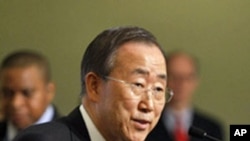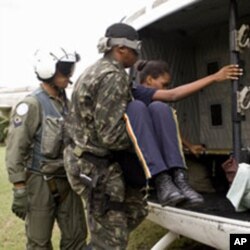The U.N. Secretary General says the facts are "grim" in Haiti, after a 7.0 earthquake rocked the Caribbean nation Tuesday. Ban Ki-moon warned that the overall death toll could be very high. Among the scores of dead, at least 36 U.N. military and civilian staff. But that figure could rise dramatically, as some 150 personnel are still unaccounted for nearly 48 hours after the quake.
Mr. Ban told reporters that the overall picture on the ground in Haiti still remains "sketchy".
He said the first 72 hours are critical in saving survivors, and he is still holding out hope for both Haitians and U.N. personnel trapped beneath the rubble.
Some 150 U.N. personnel with the U.N. Stabilization Mission, known as MINUSTAH, are still missing. But all hope is not gone. Overnight, Tarmo Joveer, an Estonian bodyguard, was pulled alive from the wreckage of the mission's 5-story concrete headquarters.
"He was extracted from approximately four meters down the rubble," said the U.N. chief. "It was a small, small miracle during the night which brought few other miracles. We will continue to work, to search and rescue as quickly as possible."
Mr. Ban said the needs in Haiti are huge and immediate - above all medical supplies, food, water, tents, shovels and heavy equipment.
That appeal was echoed during a video conference with the U.N. mission in Haiti. Officials Kim Bolduc and David Wimhurst described the scene in Port-au-Prince immediately after the quake and now.
"Many bodies along the streets, a lot of injured people, just lying around, houses are destroyed and very new and large buildings totally collapsed," said Bolduc. "Now at night, Port-au-Prince doesn't have electricity - it looks like a ghost town. The situation is very dire, because all the survivors are sleeping out in the streets."
She said people are in a state of shock, waiting for something to happen and still fearing aftershocks.
David Wimhurst said tensions are rising among the population.
"The people have lost everything, it's hopeless. It's a hopeless situation for them," he said. "They expect us to provide them with help, which is of course, what we want to do. But we are not in a situation yet where we can do that on a massive scale and unfortunately, they are slowly getting more angry I think and impatient."
The U.N. is helping to coordinate what is becoming a massive international relief effort. Search and rescue teams have arrived from several countries and more are on the way, and the United States has embarked on a massive relief operation. Donors are also making financial and aid contributions to the humanitarian effort. The U.N. is expected to launch a formal appeal Friday to fund those emergency needs.





